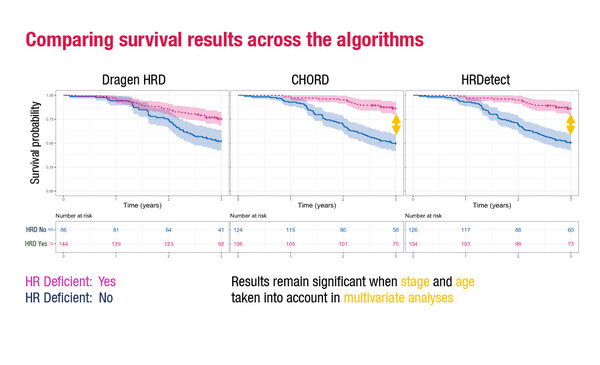Two studies investigate the value of molecular profiling in the management of ovarian and endometrial cancers
Two studies presented in a Mini Oral Session at the ESMO Gynaecological Cancers Congress 2022 today provide new insights into the use of molecular profiling for treatment selection and prognosis in ovarian and endometrial cancers.
In a real-world analysis of response and survival in patients with high-grade serous ovarian carcinoma and previous platinum-based therapy, three bioinformatic algorithms for homologous recombination deficiency (HRD) detection all showed an association of HRD status with better overall survival (CHORD: hazard ratio [HR] 0.32 [95% confidence interval (CI) 0.19–0.52]; HRDetect: HR 0.28 [95% CI 0.16–0.48]; and Dragen: HR 0.38 [95% CI 0.23–0.62]; all p<0.001) (Abstract 28MO). There was substantial concordance between algorithms and according to BRCA1/2 status. The authors suggest that incorporating multi-dimensional data, including molecular profiling, pathology and radiological imaging, into a machine-learning model will improve determination of HRD biomarkers.
“There is a real drive to come up with cost-effective means for HRD testing that can be conducted in an individual setting,” says Dr Rowan Miller from St Bartholomew's Hospital and University College London Hospital, London, UK.
In advanced ovarian cancer, testing for BRCA mutations and homologous recombination deficiency in general is now standard of care in the selection of first-line maintenance therapy for PARP-inhibitor-based treatment, although more sensitive tests, particularly beyond first line, are required (Ann Oncol. 2020;31:1606–1622).
“The algorithms tested in this study represent affordable alternatives to currently used tools and the results show that all three algorithms are feasible and reliable. Unfortunately, as noted by the authors themselves, the study does not tell us how the tests work as predictive biomarkers for response to PARP inhibitors. So there is more work to be done before such tools can be integrated into the clinic, but it is a big step in the right direction,” Miller says.
Results from another study question the prognostic contribution of molecular profiling in low-grade endometrioid endometrial cancer (EEC) (Abstract 21MO). In this retrospective analysis within the European Network for Individualized Treatment (ENITEC), profiling was investigated using single-molecule molecular inversion probes based on next-generation sequencing. In total, 393 patients were included, of whom 75% had early-stage endometrial cancer and 54% had low-grade EEC. Low-grade EEC was associated with improved disease-specific survival (DSS, >89%) compared with high-grade disease (DSS, >43%) across all the molecular subgroups (non-specific molecular profile, microsatellite instability, TP53 mutations and POLE mutations). The finding was similar for recurrence-free survival (RFS), with the exception of TP53-mutated tumours, among which only grade 1 EEC had excellent RFS (92% vs 54% for grade 2 and 44% for grade 3). In multivariate analysis, independent prognostic factors for reduced DSS were TP53 mutations (HR 1.92, p=0.021), high-grade (HR 5.61, p<0.001) and advanced stage (FIGO III–IV) (HR 3.17, p<0.001).
In endometrial cancer, its subdivision into molecular groups is recognised as being an important component of staging/prognosis (Int J Gynecol Cancer. 2021;31:12–39) and Miller thinks that molecular profiling should be standard for all patients with this malignancy. “The authors’ conclusion, that molecular profiling does not add anything prognostically for low-grade endometrial cancer, is valid. However, molecular profiling still has implications for treatment. Also, if patients have low-grade advanced-stage disease, molecular profiling might be useful for evaluating their risk of recurrence or for treatment stratification.”
According to Miller, there is still a lot we do not know about molecular profiling for gynaecological cancers: “Despite the tremendous progress we have made, it really is just the tip of the iceberg. We need more information about evaluating the risk of recurrence and treatment stratification in early-stage disease and to increase treatment options for patients with recurrent disease.”
Abstracts discussed:
Funingana IG, et al. Real-world whole sequencing data of ovarian cancer patients. ESMO Gynaecological Cancers Congress 2022, Abstract 28MO
Mini Oral Session, 18.06.2022, h. 13:00 – 14:00, Auditorium 1A
Vrede S, et al. Limited benefit of molecular profiling in patients with low-grade endometrial cancer. ESMO Gynaecological Cancers Congress 2022, Abstract 21MO
Mini Oral Session, 18.06.2022, h. 13:00 – 14:00, Auditorium 1A
Watch the sessions on demand on the Congress virtual platform.






